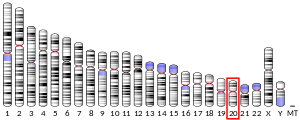MAP1LC3A
Microtubule-associated proteins 1A/1B light chain 3A is a protein that in humans is encoded by the MAP1LC3A gene.[5][6][7] Two transcript variants encoding different isoforms have been found for this gene.
Function
MAP1A and MAP1B are microtubule-associated proteins which mediate the physical interactions between microtubules and components of the cytoskeleton. MAP1A and MAP1B each consist of a heavy chain subunit and multiple light chain subunits. The protein encoded by this gene is one of the light chain subunits and can associate with either MAP1A or MAP1B.[7]
MAPLC3A is one of the mammalian homologues of yeast ATG8, an important marker and effector of autophagy.[8]
Regulation
MAP1LC3A is regulated by several post-translational modifications. These include covalent linkage of the C-terminus to phosphatidylethanolamine in autophagic membranes, and phosphorylation by protein kinase A,[9] which downregulates its autophagy functions. Noncovalent interactions are important for its cargo targeting functions in selective autophagy. For example, it has been shown to interact with sequestosome 1.[10]
References
- GRCh38: Ensembl release 89: ENSG00000101460 - Ensembl, May 2017
- GRCm38: Ensembl release 89: ENSMUSG00000027602 - Ensembl, May 2017
- "Human PubMed Reference:". National Center for Biotechnology Information, U.S. National Library of Medicine.
- "Mouse PubMed Reference:". National Center for Biotechnology Information, U.S. National Library of Medicine.
- Mann SS, Hammarback JA (May 1997). "Gene localization and developmental expression of light chain 3: a common subunit of microtubule-associated protein 1A(MAP1A) and MAP1B". J Neurosci Res. 43 (5): 535–44. doi:10.1002/(SICI)1097-4547(19960301)43:5<535::AID-JNR3>3.0.CO;2-J. PMID 8833088.
- Pankiv S, Clausen TH, Lamark T, Brech A, Bruun JA, Outzen H, Overvatn A, Bjorkoy G, Johansen T (Aug 2007). "p62/SQSTM1 binds directly to Atg8/LC3 to facilitate degradation of ubiquitinated protein aggregates by autophagy". J Biol Chem. 282 (33): 24131–45. doi:10.1074/jbc.M702824200. PMID 17580304.
- "Entrez Gene: MAP1LC3A microtubule-associated protein 1 light chain 3 alpha".
- Valente G, Morani F, Nicotra G, Fusco N, Peracchio C, Titone R, Alabiso O, Arisio R, Katsaros D, Benedetto C, Isidoro C (2014). "Expression and clinical significance of the autophagy proteins BECLIN 1 and LC3 in ovarian cancer". Biomed Res Int. 2014: 462658. doi:10.1155/2014/462658. PMC 4127242. PMID 25136588.
- Cherra SJ, Kulich SM, Uechi G, Balasubramani M, Mountzouris J, Day BW, Chu CT (August 2010). "Regulation of the autophagy protein LC3 by phosphorylation". J. Cell Biol. 190 (4): 533–9. doi:10.1083/jcb.201002108. PMC 2928022. PMID 20713600.
- Shvets E, Fass E, Scherz-Shouval R, Elazar Z (August 2008). "The N-terminus and Phe52 residue of LC3 recruit p62/SQSTM1 into autophagosomes". J. Cell Sci. 121 (Pt 16): 2685–95. doi:10.1242/jcs.026005. PMID 18653543.
Further reading
- Snásel J, Pichová I (1997). "The cleavage of host cell proteins by HIV-1 protease". Folia Biol. (Praha). 42 (5): 227–30. doi:10.1007/BF02818986. PMID 8997639.
- Wallin M, Deinum J, Goobar L, Danielson UH (1990). "Proteolytic cleavage of microtubule-associated proteins by retroviral proteinases". J. Gen. Virol. 71 (9): 1985–91. doi:10.1099/0022-1317-71-9-1985. PMID 2212989.
- Schoenfeld TA, McKerracher L, Obar R, Vallee RB (1989). "MAP 1A and MAP 1B are structurally related microtubule associated proteins with distinct developmental patterns in the CNS". J. Neurosci. 9 (5): 1712–30. doi:10.1523/JNEUROSCI.09-05-01712.1989. PMC 6569839. PMID 2470876.
- Mann SS, Hammarback JA (1994). "Molecular characterization of light chain 3. A microtubule binding subunit of MAP1A and MAP1B". J. Biol. Chem. 269 (15): 11492–7. PMID 7908909.
- Hartley JL, Temple GF, Brasch MA (2001). "DNA Cloning Using In Vitro Site-Specific Recombination". Genome Res. 10 (11): 1788–95. doi:10.1101/gr.143000. PMC 310948. PMID 11076863.
- Wiemann S, Weil B, Wellenreuther R, et al. (2001). "Toward a Catalog of Human Genes and Proteins: Sequencing and Analysis of 500 Novel Complete Protein Coding Human cDNAs". Genome Res. 11 (3): 422–35. doi:10.1101/gr.GR1547R. PMC 311072. PMID 11230166.
- Bonnet C, Boucher D, Lazereg S, et al. (2001). "Differential binding regulation of microtubule-associated proteins MAP1A, MAP1B, and MAP2 by tubulin polyglutamylation". J. Biol. Chem. 276 (16): 12839–48. doi:10.1074/jbc.M011380200. PMID 11278895.
- Deloukas P, Matthews LH, Ashurst J, et al. (2002). "The DNA sequence and comparative analysis of human chromosome 20". Nature. 414 (6866): 865–71. doi:10.1038/414865a. PMID 11780052.
- Strausberg RL, Feingold EA, Grouse LH, et al. (2003). "Generation and initial analysis of more than 15,000 full-length human and mouse cDNA sequences". Proc. Natl. Acad. Sci. U.S.A. 99 (26): 16899–903. doi:10.1073/pnas.242603899. PMC 139241. PMID 12477932.
- He H, Dang Y, Dai F, et al. (2003). "Post-translational modifications of three members of the human MAP1LC3 family and detection of a novel type of modification for MAP1LC3B". J. Biol. Chem. 278 (31): 29278–87. doi:10.1074/jbc.M303800200. PMID 12740394.
- Tanida I, Sou YS, Ezaki J, et al. (2004). "HsAtg4B/HsApg4B/autophagin-1 cleaves the carboxyl termini of three human Atg8 homologues and delipidates microtubule-associated protein light chain 3- and GABAA receptor-associated protein-phospholipid conjugates". J. Biol. Chem. 279 (35): 36268–76. doi:10.1074/jbc.M401461200. PMID 15187094.
- Kouno T, Mizuguchi M, Tanida I, et al. (2005). "1H, 13C, and 15N resonance assignments of human microtubule-associated protein light chain-3". J. Biomol. NMR. 29 (3): 415–6. doi:10.1023/B:JNMR.0000032505.99071.ea. PMID 15213446.
- Goehler H, Lalowski M, Stelzl U, et al. (2004). "A protein interaction network links GIT1, an enhancer of huntingtin aggregation, to Huntington's disease". Mol. Cell. 15 (6): 853–65. doi:10.1016/j.molcel.2004.09.016. PMID 15383276.
- Gerhard DS, Wagner L, Feingold EA, et al. (2004). "The Status, Quality, and Expansion of the NIH Full-Length cDNA Project: The Mammalian Gene Collection (MGC)". Genome Res. 14 (10B): 2121–7. doi:10.1101/gr.2596504. PMC 528928. PMID 15489334.
- Wiemann S, Arlt D, Huber W, et al. (2004). "From ORFeome to Biology: A Functional Genomics Pipeline". Genome Res. 14 (10B): 2136–44. doi:10.1101/gr.2576704. PMC 528930. PMID 15489336.
- Kouno T, Mizuguchi M, Tanida I, et al. (2005). "Solution structure of microtubule-associated protein light chain 3 and identification of its functional subdomains". J. Biol. Chem. 280 (26): 24610–7. doi:10.1074/jbc.M413565200. PMID 15857831.
- Sou YS, Tanida I, Komatsu M, et al. (2006). "Phosphatidylserine in addition to phosphatidylethanolamine is an in vitro target of the mammalian Atg8 modifiers, LC3, GABARAP, and GATE-16". J. Biol. Chem. 281 (6): 3017–24. doi:10.1074/jbc.M505888200. PMID 16303767.
- Mehrle A, Rosenfelder H, Schupp I, et al. (2006). "The LIFEdb database in 2006". Nucleic Acids Res. 34 (Database issue): D415–8. doi:10.1093/nar/gkj139. PMC 1347501. PMID 16381901.



